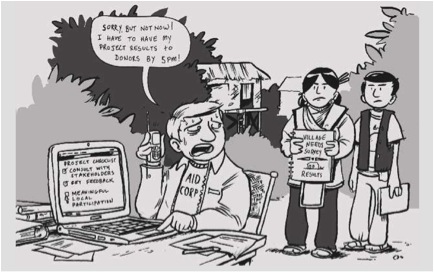No matter how self-aware we are when we come into international aid, philanthropy, or social enterprise, most people, especially in the beginning, operate from a worldview in which change in poor people’s lives is possible with our help.
As I’ve written before, the jury is still out on this in my mind.
In my career, I have had to fight hard to not let the overly technocratic, abstractionist tendencies of this work pull me under. When I started, my young, idealistic self from a small town in Nebraska was driven by passion and even if naïve, I was excited about the possibility of making the world better. I suspect that all of you started in that very same place. But where is it we find ourselves now?

A couple of months ago, on a Friday, I met with a group of impressive young people from an organization called Thinking Beyond Borders in my office. They had just returned from a gap year traveling to four countries, where they were focused on studying development theory and learning how to become effective agents of change. They spent their first week back in the U.S. and were in Washington DC., where I live, to met with various multilateral agencies and NGOs.
 Here’s what one of the students wrote to me in their thank-you note afterwards:
Here’s what one of the students wrote to me in their thank-you note afterwards:
“After a week of some somewhat disheartening meetings, it was great to see that somebody in this town has a pulse!”
These young people were so hungry, after only a week among development professionals, for an open and real conversation about development work!
Their “new eyes” reminded me about how much reductionist perspectives frame aid work and philanthropy. This can make us appear less sensitive, hardened, more disconnected, less caring, less open to possibility.
Our ability as “thinkers” to high-mindedly question everything about “what works” can insulate us. It can become just a tool of our egos. It can create a “gotcha mentality.” And it can greatly remove us from the realities of those with whom we’re supposed to be working in solidarity.
I guess it’s a good reminder for us all.
***
Related Posts
Listening to local leaders: Just more data points?
RCTs: A band-aid on a deeper issue?
Aid, Africa, Corruption and Colonialism: An Honest Conversation
Subjective, squishy, touchy, feely, and fundamental: Partnership matters
How to make people glad that you are there: Some motherly advice

I gave a talk this week in Bethlehem at the invitation of Alternative Information Center. They called it, “Should Palestinians Boycott International Aid?” which is the title of an article I published in the Guardian. Although the time limit pressured me to be direct and specific, I tried hard to be fair and non-accusatory (because, in fact, I see the problem in the system and not the fault of any one of us complicit in it). But one member of the audience was so offended by the idea that we can work different–very differently–he nearly exploded and finally left early. I still feel shaken by the fact that some people find these ideas so threatening. I see them as liberating.
I know what you mean with this article and I am moved so much that it reminds me of some of things I see on this side of the world. There seems to be no openness to new ideas and ways of doing things where development is concerned. I marvel at the way we practitioners have become so mechanical and robotic in our approach its either our or the highway. I believe we need fresh ideas in development and we old horses need to embrace them. Which is why I agree with the impressive young person who speaks about the “pulse” and definitely to change the world we need a “pulse”. In research we speak about replication of best practice,but best practice shouldn’t block innovation which is why I always believe that we need to breath life into our interventions with the freshness of aggressive ideas from young minds and harness them by adding experience. Closing the door to vibrancy is terrible because it makes our work boring and repetitive thus not attractive to donors, doing the same thing the same way over and over again creates apathy because it doesn’t generate different results at all.
Thank you for this potent reminder!
Pingback: An Ode to Disruptors (Courtesy of How Matters) | Raïsa Mirza